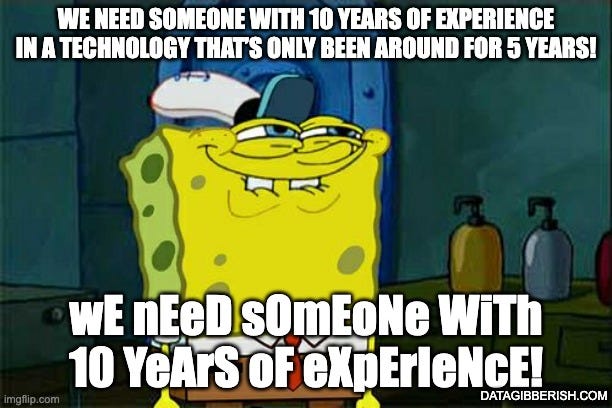Data Team Building 101: The Surprising Trait That Beats Experience
Forget what you know about traditional hiring. Reveal why curiosity helps data teams outperform competitors and adapt to future challenges.
Check my Leading Data Teams Playlist to learn more about how to build efficient data teams.
Greetings, curious reader,
The data industry has long focused on technical prowess. Degrees, certifications, and experience from top tech companies often take centre stage. However, I'm here to challenge this notion. I believe curiosity is the ultimate trait of data professionals.
Let's dive into this unconventional idea. Think about the last time you solved a complex data problem. Was it your SQL skills or your burning desire to understand? Curiosity drives you to question, explore new avenues, and push boundaries. It's the spark behind innovation and the fuel for continuous learning.
You might be sceptical. After all, technical skills are crucial in our field. But consider this: technology evolves. What's cutting-edge today might be obsolete in a few years. Curiosity, on the other hand, never goes out of style. It's the trait that enables us to adapt, learn, and grow.
In this article, I'll explore why curiosity should be the top priority in data talent acquisition. I'll share real-world examples, address potential drawbacks, and provide practical tips. By the end, you might just rethink your approach to hiring and developing data talent.
Reading time: 8 minutes
The Status Quo: When Skills Trump Inquisitiveness
The current landscape of data talent acquisition focuses heavily on technical skills. Hiring managers often prioritise candidates with impressive resumes. They look for degrees from top universities and certifications in the latest technologies. Experience at well-known tech companies usually seals the deal.
This approach seems logical at first glance. After all, data engineering requires technical expertise. You need professionals who can wrangle data, build pipelines, and optimise databases. The ability to code in Python, write complex SQL queries, and manage cloud infrastructure is crucial.
However, this focus on technical skills has its drawbacks. It often leads to a narrow pool of candidates. You might miss out on diverse perspectives and innovative thinkers. Moreover, it can result in teams filled with technically proficient but uninspired professionals.
The emphasis on degrees and certifications can be misleading. These credentials don't always translate to real-world problem-solving abilities. They also don't guarantee a candidate's ability to adapt to new technologies or business needs.
Prioritising candidates from top tech companies has its own set of issues. While these professionals often have valuable experience, they might struggle to adapt to different environments. They may also come with inflated salary expectations, straining your budget.
This status quo approach often overlooks crucial soft skills. Curiosity, creativity, and critical thinking take a backseat. Yet, these are the skills driving innovation in the data world.
Unleashing the Power of Why: Benefits of the Curiosity-First Approach
Adopting a curiosity-first approach in data talent acquisition can yield significant benefits. First and foremost, you'll build more innovative and adaptable data teams. Curious professionals are always looking for new and better ways to do things. They're more likely to embrace new technologies and methodologies.
When you're curious, you're more likely to question existing processes. You don't accept "because we've always done it this way" as an answer. This questioning attitude often leads to process improvements and innovations.
Improved problem-solving capabilities are another critical benefit. Curious data professionals don't just solve problems. They dig deeper to understand the root causes. They're more likely to come up with comprehensive, long-term solutions rather than quick fixes.
A curiosity-first approach leads to better alignment between data solutions and business needs. Curious data professionals don't just focus on their specific tasks. They seek to understand how their work fits into the bigger picture. This holistic view often results in more effective and aligned data solutions.
Perhaps one of the most significant benefits is increased employee engagement and retention. Curious professionals are naturally motivated to learn and grow. They're more likely to find their work engaging and fulfilling. This intrinsic motivation often leads to higher job satisfaction and lower turnover rates.
Curious data teams are also more likely to collaborate effectively. They're interested in learning from others and sharing their own insights. This fosters a culture of knowledge sharing and collective growth.
Moreover, a curiosity-driven approach can lead to unexpected innovations. When encouraged to explore and question, professionals often stumble upon valuable insights or solutions. These serendipitous discoveries can provide significant competitive advantages.
You're creating a more adaptable, innovative, and effective data team by fostering curiosity. You're building a team capable of keeping up with change and driving it.
Playing Devil's Advocate: Addressing the Skeptics
I know what you think, and you are right.
You can't ignore the importance of technical skills. Data engineering requires a solid foundation in programming, database management, and data infrastructure. Without these skills, even the most curious professionals might struggle implementing their ideas.
There's also the challenge of measuring and assessing curiosity. Unlike technical skills, curiosity isn't easily quantifiable. How do you objectively evaluate a candidate's level of curiosity during the hiring process? This ambiguity can make it challenging to implement a curiosity-first approach.
Another valid concern is the potential for curious professionals to get distracted. They might lose focus on their primary tasks in the quest for knowledge. There's a risk of going down rabbit holes or pursuing interesting but ultimately unproductive avenues. I do that often.
Moreover, you might need someone who can hit the ground running in some situations. A highly curious but less technically skilled professional might require more time to become productive. This could be a challenge in fast-paced environments or time-sensitive projects.
There's also the question of balance. While curiosity is valuable, it needs to be coupled with execution skills. A professional who's constantly questioning but never implementing might not be effective in a practical setting.
These are all valid concerns. However, I believe the benefits of prioritising curiosity outweigh these potential drawbacks. The key lies in finding the right balance and implementing appropriate strategies to harness curiosity effectively.
Cultivating Curiosity: From Theory to Practice
Now, let's talk about how to implement this curiosity-first approach. Here are some practical tips for assessing curiosity during the hiring process:
Ask open-ended questions about past projects or challenges.
Present hypothetical scenarios and evaluate the candidate's approach.
Look for evidence of self-directed learning or side projects.
Pay attention to the questions candidates ask you.
Once you've hired curious professionals, fostering that curiosity is crucial. Here are some strategies:
Encourage experimentation and provide time for exploration.
Create a safe environment for asking questions and challenging assumptions.
Recognise and reward innovative ideas, even if they don't all pan out.
Provide opportunities for cross-functional learning and collaboration.
Balancing curiosity with technical skill development is critical. Here are some ways to achieve this:
Set clear goals and expectations to keep curiosity focused.
Provide structured learning opportunities alongside free exploration time.
Encourage curious professionals to share their learnings with the team.
Pair curious but less experienced team members with technical mentors.
Remember, cultivating curiosity is an ongoing process. It requires commitment from both leadership and team members. But the payoff in terms of innovation and team performance can be substantial.
Final Thoughts
As you and I look to the future of data engineering, curiosity will play an increasingly crucial role. The field is evolving constantly with new technologies and methodologies. Curious professionals will be better equipped to navigate this changing landscape.
Artificial Intelligence and Machine Learning are revolutionising data engineering. Curious data professionals will be at the forefront of exploring and implementing these technologies. They'll ask the right questions to ensure AI's ethical and practical use in data processes.
The future also holds challenges around data privacy and security. Curious data engineers will be vital in developing innovative solutions to protect sensitive information while still deriving valuable insights.
Curious data professionals will bridge the gap between technical and business domains as data becomes increasingly central to business strategy. They'll drive the development of data products directly aligned with business goals.
The curious future of data engineering is one of continuous learning and adaptation. It's a future where asking "why" is just as important as knowing "how." It's a future where innovation is driven not just by technical skills but by an insatiable desire to understand and improve.
So, I challenge you: embrace curiosity in your data team. Foster it, reward it, and watch as it transforms your data engineering practice.
Summary
Let's recap the key points we've covered:
Curiosity is a crucial trait for data professionals, often surpassing technical skills in importance.
The current focus on technical skills in hiring can overlook valuable, innovative thinkers.
Curious professionals drive innovation, improve problem-solving, and quickly adapt to change.
Real-world examples show how curiosity can lead to significant improvements and innovations.
Implementing a curiosity-first approach requires changes in hiring practices and team culture.
Balancing curiosity with technical skill development is vital to building effective data teams.
The future of data engineering will increasingly rely on curious professionals to navigate new challenges.
Remember, curiosity isn't just a nice-to-have trait. It's the driving force behind innovation, adaptation, and success. You're not just building a team for today's challenges by prioritising curiosity. You're creating a data engineering powerhouse capable of shaping the future.
Until next time,
Yordan
Picks of the Week
I usually share only 3 articles, but this week was packed with great content. I couldn't help myself but share 4 articles this time.
What is data engineering? What responsibilities does a data engineer have? Why is it hard to make an impact as a data engineer? Check the latest article by
has all the answers. (link)While we are on the topic, let's talk about different types of data engineers. According to
, there are 3 types of data engineers. Which type are you? (link)So, you decide to use dbt. How do you run it?
has a few ideas. Option #2 is my favourite. (link)What is the most significant problem data leaders have? I believe it's the alignment between tech and business. In this remarkable collaboration between
and , discuss how you can build a data-driven model. Beware, there are a lot of marketing therm. (link)
Join the Community
, , and I believe that weekly newsletters were insufficient. We launched an exclusive Discord community where you can dive into vibrant discussions on software and data engineering, leadership, and the creator economy.We're just lifting off. Be among the pioneers to join today, and let's supercharge our professional journeys together!
How Am I Doing?
I love hearing you. How am I doing with Data Gibberish? Is there anything you’d like to see more or less? Which aspects of the newsletter do you enjoy the most?
Use the links below, or even better, hit reply and say “Hello”. Be honest!






